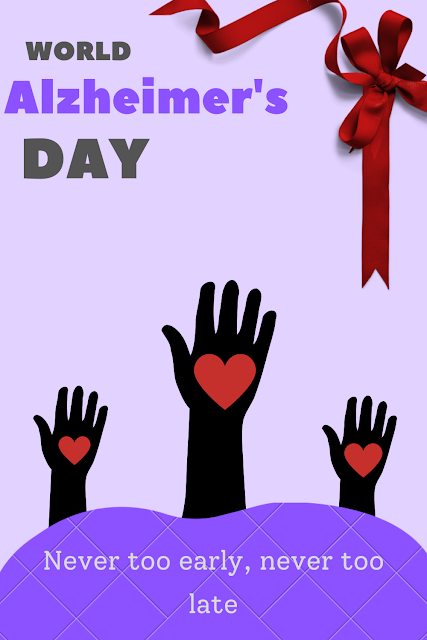Introduction
"World Alzheimer's Day", observed on September 21 each year, serves as an important reminder of the impact of Alzheimer's disease and related dementias on individuals, families and societies around the world. Alzheimer's is a serious brain disorder that gradually impairs cognitive functions, affecting memory, thinking and behavior. This World Alzheimer's Day, let's explore proactive risk reduction measures that can help prevent or delay the onset of Alzheimer's and improve the quality of life for both patients and caregivers.Understanding Alzheimer's Disease
Alzheimer's disease is the most common cause of dementia, a group of cognitive impairments that interfere with one's daily living activities. It is characterized by abnormal protein deposits in the brain, leading to death of brain cells and decline in cognitive abilities. The Alzheimer's Association estimates that 50 million people worldwide are living with dementia, with Alzheimer's responsible for 60–70% of cases.
Theme
According to the Alzheimer's Disease International, the theme for the month-long campaign is "Never too early, never too late."
Significance
This year's theme focuses on identifying risk factors and adopting measures that can help prevent the onset of dementia.
Identifying risk factors
While age is the primary risk factor for Alzheimer's, other factors can increase a person's susceptibility. These include genetics, family history, and certain medical conditions such as cardiovascular disease and diabetes. It is important to acknowledge that not all risk factors can be controlled, but active measures can be taken to reduce their risk.
Proactive Risk Mitigation Measures
- Maintain a healthy lifestyle: Regular physical exercise, balanced diet and weight management play an important role in reducing the risk of Alzheimer's. Engaging in activities that promote cardiovascular health, such as walking, swimming or bicycling, can improve blood flow to the brain and reduce the risk of vascular dementia, a type of dementia linked to heart disease. Is.
- Cognitive stimulation: Keeping the brain active through activities like puzzles, reading, learning a new language or engaging in hobbies can help build cognitive reserves, potentially delaying the onset of symptoms.
- Social engagement: Being socially active and maintaining strong social connections can protect against cognitive decline. Social interaction stimulates the brain and contributes to emotional well-being.
- Manage chronic conditions: Managing chronic diseases such as high blood pressure, diabetes and high cholesterol through medication, a healthy diet and regular checkups can reduce the risk of Alzheimer's, as these conditions are associated with vascular problems that Affects brain health.
- Adequate sleep: Prioritize good sleep hygiene to support cognitive health. Sleep is important for memory consolidation and overall functioning of the brain.
- Mental health: It is important to address and manage stress, depression, and anxiety, as these conditions can increase the risk of cognitive decline.
- Alzheimer's Association Support: Get support from organizations like the Alzheimer's Association, which provides resources, information, and support for Alzheimer's patients and their families.
Diet effect/aliment impact
Although no cure for Alzheimer's currently exists, the active measures discussed can have a significant impact on one's risk and quality of life. By making healthy lifestyle choices and staying informed about risk factors and available resources, individuals can take steps toward reducing their susceptibility to this devastating disease.
History
A Brief History of World Alzheimer's Day
World Alzheimer's Day, observed each year on September 21, has a poignant history rooted in a global effort to raise awareness about Alzheimer's disease and dementia. The date was chosen to celebrate the birthday of Dr. Alois Alzheimer, the German psychiatrist and neurologist who first identified the condition that now bears his name.
Dr. Alois Alzheimer's groundbreaking work began in the early 20th century when he examined the brain of a woman named Auguste Detmer, who was suffering from memory loss, confusion, and other cognitive symptoms. In 1906, after his death, Dr. Alzheimer conducted a detailed examination of his brain tissue and discovered abnormal protein deposits (now known as amyloid plaques) and tangled nerve fibers (tau tangles) – Alzheimer's Two main features of the disease.
His discovery marked a turning point in the understanding of cognitive disorders, ultimately leading to the recognition of Alzheimer's as a distinct medical condition. Dr. Alzheimer's pioneering research laid the foundation for future studies on the disease, increasing the medical community's interest in dementia research.
The first World Alzheimer's Day was established in 1994 by Alzheimer's Disease International (ADI), a global federation of Alzheimer's associations. ADI recognized the need to create a day dedicated to raising awareness of Alzheimer's and related dementias, destigmatizing the condition, and advocating for better support and care for patients and their families.
Since its inception, World Alzheimer's Day has become a global movement. It provides a platform for Alzheimer's organizations, health care professionals, researchers, caregivers, and individuals affected by the disease to come together, share knowledge, and promote proactive measures to combat Alzheimer's and dementia.
Each year, World Alzheimer's Day focuses on a specific theme or issue related to dementia. The day's activities include educational programs, conferences, workshops, fundraising events, and campaigns to increase public understanding about Alzheimer's and advocate for better care and research funding.
Ultimately, World Alzheimer's Day serves as a testament to the dedication of health professionals, researchers, caregivers, and organizations around the world in the fight against Alzheimer's disease. It not only honors the pioneering work of Dr. Alois Alzheimer, but also reaffirms our commitment to raising awareness, reducing risk factors, and improving the lives of individuals affected by Alzheimer's and dementia.
conclusion
On World Alzheimer's Day, we reflect on the enormous challenges faced by Alzheimer's patients and their families. While Alzheimer's disease remains a formidable adversary, active risk reduction measures offer hope for a brighter future. By addressing risk factors, maintaining a healthy lifestyle, and seeking support from organizations like the Alzheimer's Association, we can work together to reduce the burden of this disease and improve the lives of those affected by it. Remember, every effort counts in the fight against Alzheimer's and it starts with awareness and action.

That's great info 👍
ReplyDelete